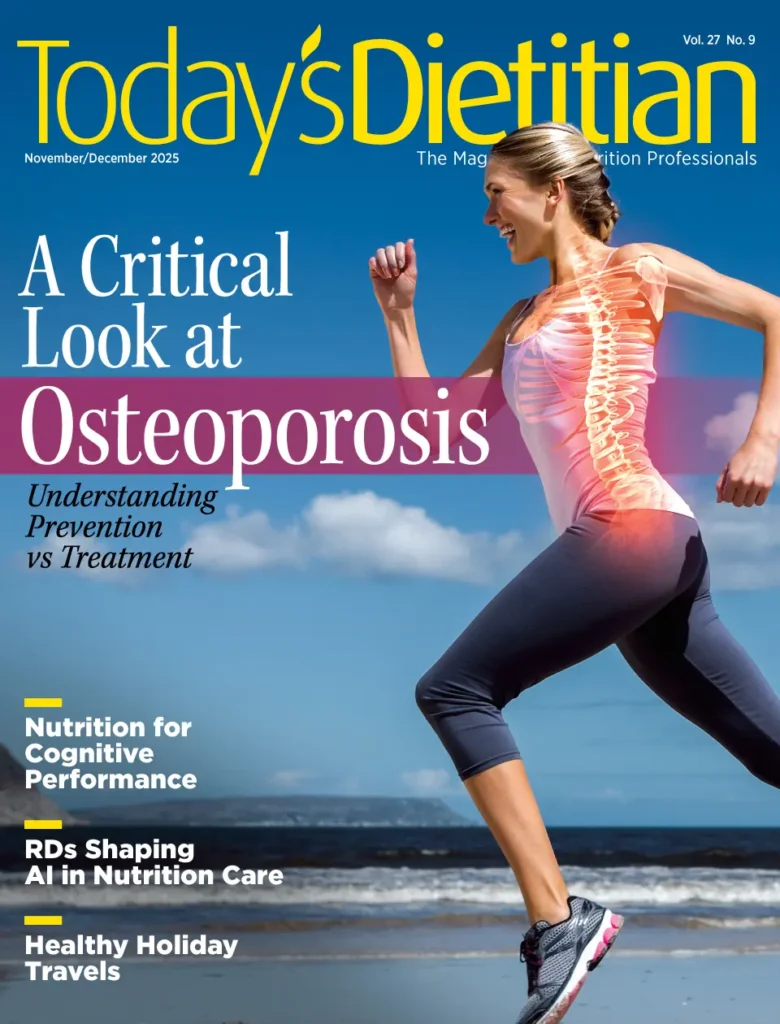Today’s Dietitian
Vol. 26 No. 7 P. 7
Q: Can you explain what health claims are and the process of obtaining them?
A: Health claims characterize the relationship between a substance and its ability to reduce the risk of a disease or health-related condition.1 The FDA acknowledges that consumers benefit from more information on food labels regarding diet and health. It’s imperative for RDs to understand the rigor and procedures involved in the creation of health claims in order to better explain their meaning to clients. The following is an explanation of the types of health claims and the regulatory steps needed to obtain them.
The Benefits of Health Claims
When a food or beverage carries a health claim it can be a benefit for customers and potentially increase consumption of that food or beverage. Guy H. Johnson, PhD, principal at Johnson Nutrition Solutions, LLC and an adjunct professor at the University of Illinois at Urbana-Champaign, explains that prior buying history corroborates this relationship based on a Federal Trade Commission published report where dietary fiber consumption increased dramatically after Kellogg made the first health claim for dietary fiber and cancer on All-Bran cereal boxes in 1984.2 This example shows that consumers tend to listen to health claims and purchase products with more of the food mentioned (here, fiber), which then provides incentive for cereal makers and other manufacturers to introduce more high-fiber products—resulting in a win-win for all.
Types of Health Claims
Health claims are defined by statute and/or FDA regulations. According to Amanda Blechman, RDN, CDN, director of health and scientific affairs at Danone North America, “Health claims specifically describe the relationship between a food, food component, or dietary ingredient and a reduced risk of a disease or health-related condition.”
Looking deeper into health claims, the FDA authorizes them based on the level of scientific evidence present to support the claim. There are authorized health claims and qualified health claims. Blechman explains that an authorized health claim is defined and permitted by the Federal Food, Drug, and Cosmetic Act and must meet “significant scientific agreement” standards or be based on authoritative statements from federal scientific bodies. Since 1990, the FDA has authorized only 12 health claims. An example of one of these authorized health claims is the relationship between calcium, vitamin D, and osteoporosis.3
On the other hand, qualified health claims stem from emerging evidence that doesn’t meet significant scientific agreement standards. As such, qualified health claims are not “approved” by the FDA or published in the Code of Federal Regulations. Rather, in response to a petition submitted by a food manufacturer or other entity, the FDA issues a letter of enforcement discretion describing the FDA’s assessment of the science relevant to the claim and, if sufficient science exists, setting out specific qualified claim language for which the FDA will exercise enforcement discretion.
“It doesn’t mean supporting scientific evidence doesn’t exist or isn’t credible,” Blechman explains. On the contrary, “[the] FDA still requires that the totality of the body of evidence of good methodological quality must support the claim; the qualifications instead reflect that significant scientific agreement is not yet achieved and that more research is warranted to further strengthen the claim.”
The Latest Qualified Health Claim
In response to a petition by Danone North America, the FDA announced the first-ever qualified health claim for yogurt, recognizing a potential link between this dairy aisle staple and a reduced risk of type 2 diabetes. According to Blechman, “This announcement is nearly five years in the making, during which time the FDA reviewed the available research on yogurt and type 2 diabetes, including 12 large cohort studies with over 400,000 individuals—and found that the evidence suggests including yogurt in the typical American diet, could have a benefit to public health.”
Recommendations for RDs
RDs should be aware of the extensive process involved in any health claim, as each one can take years and an intense amount of research to gain approval from the FDA. RDs can use these claims to help educate consumers about overall better dietary choices for better health. Overall, health claims can be powerful supplemental tools for nutrition education. According to Johnson, “These claims are regulated by the FDA, and many products that are eligible to make them are also recommended by the Dietary Guidelines for Americans.” Johnson provides a few examples of qualified health claims in foods, including yogurts, low-saturated fat vegetable oils, and most tree nuts. In addition, Blechman adds that qualified health claims “offer an opportunity to provide consumers with information regarding the relationship between a food or food component and a health-related condition” and hopes that qualified health claims will give shoppers simple, easy-to implement information they can use to work toward their overall health.
— Toby Amidor, MS, RD, CDN, FAND, is the founder of Toby Amidor Nutrition (tobyamidornutrition.com) and a Wall Street Journal bestselling author. She’s the author of 11 cookbooks, including her upcoming Health Shots: 50 Simple, Healing Tonics to Help Improve Immunity, Ease Anxiety, Boost Energy, and More (December 2024). She’s also a nutrition expert for FoodNetwork.com, contributes to numerous national media outlets, and appears on television regularly.
References
1. Guidance for industry: FDA’s implementation of qualified health claims. FDA website. https://www.fda.gov/regulatory-information/search-fda-guidance-documents/guidance-industry-fdas-implementation-qualified-health-claims. Published 2006.
2. Ippolito PM, Mathios AD. Health claims in advertising and labeling, a study of the cereal market. Bureau of Economics Staff Report, Federal Trade Commission. https://www.ftc.gov/sites/default/files/documents/reports/health-claims-advertising-and-labeling-study-cereal-market/232187.pdf. Published August 1989. Accessed June 7, 2024.
3. CFR – Code of Federal Regulations Title 21. FDA website. https://www.accessdata.fda.gov/scripts/cdrh/cfdocs/cfcfr/CFRSearch.cfm?fr=101.72#:~:text=101.72%20Health%20claims%3A%20calcium%2C%20vitamin,in%20the%20development%20of%20osteoporosis. Updated December 22, 2023. Accessed June 5, 2024.



